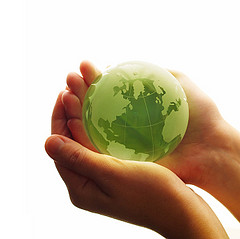 How we brand environmental challenges may have a big impact on our planet’s fate.
How we brand environmental challenges may have a big impact on our planet’s fate.
So suggests New York Times “Dot Earth” blogger Andrew C. Revkin. “If I had to choose one of two bumper stickers for our car — CLIMATE CRISIS or ENERGY QUEST — I’d choose the latter,” he says. “This doesn’t mean I reject the idea that we face a climate crisis. I just don’t think that phrase is a productive way to frame this challenge, particularly as defined over the last few years in the heated policy debate.”
If we must consider ourselves in crisis, he says, let’s define it right. Citing a colleague’s argument, Revkin views crisis less as catastrophe or cause for alarmism than a crucial or decisive moment, a turning point. This approach seems to cool passion without sacrificing urgency. And though Revkin sees a need to act immediately, he wants to focus on the positive.
I’m talking about a sustained quest, from the household light socket to the boardroom, the laboratory to the classroom, the smart post-industrial American city to the struggling, (literally) powerless sub-Saharan village. This is not some onerous task, but an active, positive assertion that the ways we harvest and use energy — an asset long taken for granted and priced in ways that mask its broader costs — really do matter. Dry places do this with water all the time. In Israel, there is no toilet without two flush options. It’s not some goofball green concept; it’s just the way things are done.
The TriplePundit blog’s Deborah Fleischer has some complementary ideas for effective sustainability communications. Although the post has corporate social responsibility (CSR) reports in mind, the principles can apply to any communication.
Tell positive stories about specific challenges and successes.
Make a specific request. Instead of calling for a new green mindset, for example, suggest specific actions like printing on double sides or reusing water bottles.
Engage people’s emotions. Data and logic are great, now bring it home. How many trees does that equal? Present a photo of a forest as big as the thing you’re talking about, or work in three dimensions by, say, creating a sculpture from all the plastic water bottles you’ve collected in your office. For mind-blowing, emotion-charged examples of consumption run amok, see artist Chris Jordan’s portraits of mass consumption.
Finally, use non-controlling language. Try please think about and please consider instead of you should.
Whether your planet or your business is at stake (somehow I believe they’re interconnected), how you say it is important.